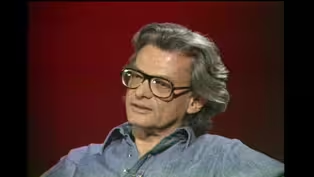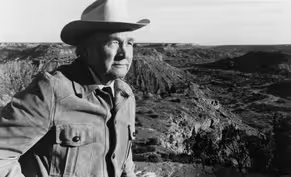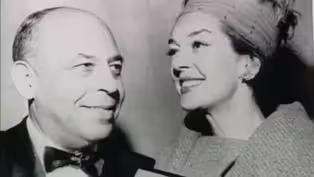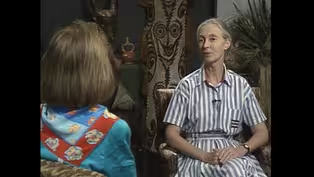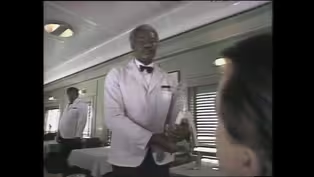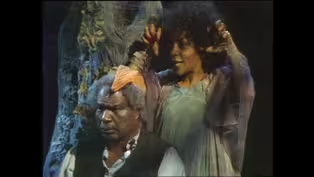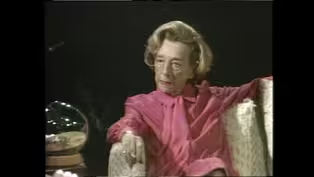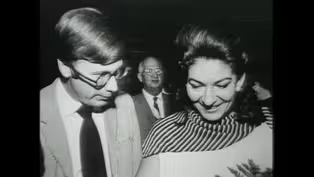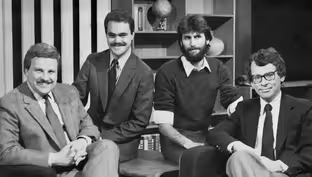From the Archives
Profile: Lillian Hellman, Episode 3
Special | 29m 5sVideo has Closed Captions
Writer Lillian Hellman discusses the McCarthy era, Watergate, and her perspective on leadership.
A five-part, 1980 series on controversial writer Lillian Hellman. In episode 3, Hellman discusses her appearance before the House Un-American Activities Committee, the McCarthy era, Watergate, and her view of leadership.
Problems playing video? | Closed Captioning Feedback
Problems playing video? | Closed Captioning Feedback
From the Archives is a local public television program presented by KERA
From the Archives
Profile: Lillian Hellman, Episode 3
Special | 29m 5sVideo has Closed Captions
A five-part, 1980 series on controversial writer Lillian Hellman. In episode 3, Hellman discusses her appearance before the House Un-American Activities Committee, the McCarthy era, Watergate, and her view of leadership.
Problems playing video? | Closed Captioning Feedback
How to Watch From the Archives
From the Archives is available to stream on pbs.org and the free PBS App, available on iPhone, Apple TV, Android TV, Android smartphones, Amazon Fire TV, Amazon Fire Tablet, Roku, Samsung Smart TV, and Vizio.
More from This Collection
Take a tour through 65 years of KERA programming.
Swank in the Arts: Richard Avedon
Richard Avedon discusses photography, his inspirations, and The Amon Carter's IN THE AMERICAN WEST. (29m 15s)
Nowhere But Texas 1 nostalgically explores fascinating but seldom-heard Texas stories. (58m 16s)
Legacies of the Land: A Tale of Texas
The show is an armchair tour through the legends, tall tales, and oil wells that pervade Texas land. (59m 25s)
A Conversation with Stanley Marcus
Stanley Marcus discusses how he transformed a small specialty shop into a global retail business. (26m 5s)
A Conversation with Jane Goodall
In 1990, journalist Lee Cullum talked with ethologist and conservation activist Dr. Jane Goodall as (29m 21s)
With Ossie & Ruby: Solo Song for Doc
a 1940s-era drama about Doc Craft, a dining car waiter who realizes his company wants him to retire. (29m 18s)
With Ossie & Ruby: Ghost Stories
The episode, “Ghost Stories,” aired in April 1982, with special guest, respected (30m 15s)
Profile: Lillian Hellman, Episode 4
Lillian Hellman discusses her financial struggles, her partner Dashiell Hammett, and her childhood. (29m 32s)
Swank in the Arts: John Ardoin profile on Maria Callas
Video has Closed Captions
Patsy Swank talks to then-Dallas Morning News music critic John Ardoin for a profile on his friend, (29m 43s)
Business Edition with David Johnson: Howard Putnam, Braniff
David Johnson speaks with CEO Howard Putnam, who speaks positively about Braniff's outlook. (28m 46s)
Video has Closed Captions
Helen Hayes invites viewers to celebrate some of America’s greatest treasures - wildflowers! (27m 40s)
Video has Closed Captions
The museum is an architectural achievement of modern times. Hear from its founder and architect. (23m 14s)
Providing Support for PBS.org
Learn Moreabout PBS online sponsorshipProfile is made possible by grants from the Corporation for Public Broadcasting and the Texas Committee for the Humanities.
It always is crazy for survivors to talk about surviving.
There's something almost callous about success ever gave me as much pleasure as it gave most people.
I'm not alone, and I'm very sad about it.
I understand how much of this very sad and very complex.
I did finally take the Fifth Amendment.
I tried not to take the fifth House un-American, but I said, call me and talk about myself.
There was no my mother and I. I'm sorry I didn't get along.
Annoyed me.
I had stopped writing and by the time I was not going any good and I was going to bed.
I've long ago stopped thinking about.
What happiness is taking for granted that there was no arbitrary.
Definition of it.
Well, I have to tell you, it's going to sound awful.
Because it's going to sound so, so mixed up.
I'm.
Pleased with what I did in front of the House un-American Committee.
Because it had good results and it led other people to take the same position, which was the first time anybody had ever taken it.
I am pleased with it, but I'm very regretful that I didn't take another one.
I know that sounds crazy because I know I've come out a kind of heroine for the position I did take, so it sounds as if the heroine is wants to be even more of a heroine, which isn't what I mean.
I have long wished I wished.
Even before I wrote that letter and went into that committee hearing that I really wanted to go in and say, to hell with all of you.
You're a rotten, stinking lot of unjust men ragging me and everybody like me simply to get your names in the papers.
You know full well I've done no harm, and you know full well nobody you've had here has done any harm.
You're a disgrace to your country.
And I won't stay in the room with you and walked out.
This is what I really would have liked to have done, and gone to jail for it.
But I didn't have the nerve to do it.
And there's no sense regretting it, because I simply didn't have the nerve to do it.
I thought I was going to jail anyway, but.
And everybody else thought I was going to jail, too.
Hammett certainly did.
He used to spend his entire time trying to persuade me not to write that letter that I wrote by.
He knew I was terrified of rats, as everybody born in New Orleans, Louisiana, was in my day, but I was.
I have a particular horror of rats.
So he used to describe to me rats in jail every single night of his life.
I got a little talk about rats in jail and how I was going to eat.
It also knows that I have had a neurotic.
I have a I have it to this minute, an erotic horror of being pushed or shoved in a crowd or any other place.
So he used to describe to me how I was going to be shoved in jail, and how I was going to turn on somebody, and that night I was going to be dead.
I'd get this lecture every night.
Did you feel that you wanted to take that stand at the time, or do you feel it now that you wish you had taken that stand?
It crossed my mind.
And let me say it as honestly as I can.
It crossed my mind that that's what I wanted to do.
It never crossed my mind, seriously, that that's what I was going to do because I was already scared enough of what I did.
That's to say it as truthfully as I can say it.
The young people students have embraced scoundrel the time.
They have been your great readers, and yet they don't seem to know very much about the so-called McCarthy years.
What's your view of that era?
How do you see those years?
How do you remember them?
Well, that's a I'm not sure that I'm the best judge.
I was so involved and.
In many ways punished and living with a man who was so punished that.
Well, no, that's I'm begging the question now because I think I would have seen them whether I was punished or not, the same way they would.
They were all kinds of things.
They were comedy.
They were black comedies.
They were really black comedy.
Have you ever read any of the testimonies of the questions or the testimonies of witnesses?
Or it's one is torn between laughter And and and tears.
It's so truly karmic.
People were confessing to sins they'd never done.
Making up lies of meetings they'd been in when they'd been.
So no such meeting.
Uh, asking God in the committee's pardon for nothing.
For just going into a room and listening to some rather dull talk.
They were.
That was one of the effects.
And that, to me, was the saddest and most disgusting, uh, as well as most comic.
The effect was of.
A certain section of the country going crazy.
Which section?
Uh, Washington.
The men Involved in the committees.
The committees that were involved with Newark in the Senate Internal Security Committee, which was McCarthy Committee.
For their own reasons.
The reasons being, uh, they could get their names in the papers every day by using more famous people than they were and they were playing on.
Of course, the Cold War, the fear of our ex ally Russia.
And they were led by, and I think in many ways paid for or by, in some cases paid for by not in many ways was what was known as the China lobby.
The China lobby was a group of men who were out to restore Chiang Kai shek.
Uh.
Well, this was an era just to reconstruct it a little bit.
That in 1945, when the war ended, we read at least that the United States started demobilization, cut down its troops, cut its defense budget.
The Russians are getting one.
We're forgetting something.
Forgive me for interrupting you here.
We didn't so voluntarily demobilize as a demobilization was demanded an absolute demand of the American people.
And you say the Russians were devastated as they were.
And some kind of psychosis grew in this country when the Russians, in their own drive for some sort of self-protection, created a belt around the Soviet Union.
Absolutely.
The fall of Czechoslovakia was one.
Absolutely.
And, and and they're taking Poland and not being willing to give it up.
And Finland, of course we were very nervous characters with with certainly some justice without question that we were now facing a.
A world we had never known before and had not not expected.
Uh, whether some of that bargain had been made at the altar.
I suppose none of us will ever know.
Uh, uh, but we were facing a new world, and we had some some of these men, the serious men, the ones among them had some reason for fear of where the Soviet Union, once it recovered, would go.
Uh.
But these particular people we're talking about were not those people.
They were on a much lower level.
They were not serious people.
No, they were not.
Not only not serious people.
They were.
They were.
It is if one talked about.
Say a good college teacher.
And then one talked about people in kindergarten.
Uh, these people were mostly unknown men at this point in their lives.
Nixon was a fairly unknown man.
McCarthy was a very unknown man.
McCarren, who was among the worst, was not unknown, but was not brilliantly known that they were men cashing in.
In a quite scandalous way on perhaps normal and expected fears.
Uh, I'm not for a minute saying that we didn't have a right to be frightened of the imperialism of the Soviet Union.
Uh.
But we didn't.
It certainly didn't solve anything to bring a movie actor before a committee to express it.
The committee wished to hear drama, and these people supplied the drama.
And the drama was full of lies.
So they made liars out of rather simple minded people, but simple minded people trained in drama and simple minded people who were very, very frightened people.
Actually, a third of the people who went before the committee at that time name names and the rest didn't.
Now, I don't know enough of the history to know if you were the first not to name names.
Yes.
Oh, no.
No, no.
Great.
Many people didn't name names.
Oh, no no, no, that wasn't my stand at all.
No, I understand that, but it was part of your stand.
And that's one of the attacks on you that you represent yourself in the book as standing alone when not.
Oh, no, not that I don't think that's.
I'm saying that's one of the attacks.
It's not a close reading of the book that shows that, uh, no, most I came to see I was rather at the bottom of the barrel that I didn't.
I wasn't called till 1952.
They'd been at this game for a long time, and many people didn't name names.
The famous Hollywood ten didn't.
Oh, but they went to jail.
And they say that.
The critics say that at the time, you were before the committee and you call yourself the bottom of the barrel.
There really was no danger of your going to prison.
But you say there was that that I think Mr. Rao and Abe Fortas, who thought up the position would tell you it was not the truth, I was.
I was legal only on the grounds.
It has nothing to do with heroics and not heroics.
It has to do with legalities which are never heroic of one way or the other.
The only difference in my position from other people's positions was I tried not.
I did finally take the Fifth Amendment.
I tried not to take the Fifth Amendment.
What I said was, I will talk about myself freely.
I will not give you mention anybody else's name under any circumstances that is in violation of the Fifth Amendment, and thus you are legally open to any contempt charge that can be brought.
And this is what they were they were very frightened of.
You were the first to do that.
I say I will speak of myself.
It was not my idea.
It was the idea of the very brilliant Abe Fortas, uh, and was carried out not only with the aid, but with the thoughtfulness of the very famous Joseph Rauh.
But they were very worried I was going to be very nervous about my going to jail on it, uh, that they had no legal grounds to stand on.
There were no heroics about it one way or the other.
The heroics had been thought of by people.
The people who don't like me.
Why do you think they did not send you to jail?
I think it was a technicality.
Um, at least we thought so.
That day, the.
The counselor whose name was Taverner, uh.
Made a mistake.
It was an interesting day.
I, um, I had written a letter two days before the committee had received it, and had replied that they would not allow the position.
Thus Mr. Rao very brilliantly had the letters um mimeographed.
I guess in those days I was xeroxed.
I don't think xeroxed, mimeographed, I think, and get a whole stack on the way.
I didn't know why I did the they had not been very willing to advertise my appearance, the committee.
So the room was almost empty, except for 6 or 7 sort of middle aged southern ladies in the background.
Well, obviously very anti me.
Uh.
Then suddenly the room began to fill.
I have no idea why to this day.
And suddenly the press boxes began.
The press box began to fill.
I haven't any idea how.
Maybe I did it, I don't know.
Uh, so they having refused to accept the letter.
There was nothing for me to do except to take the Fifth Amendment.
Uh, there was no place for me to go.
Once in a while, I slipped on the Fifth Amendment and made brow very nervous.
Because for the amendment made me so angry that I was violating it once.
I violated it once.
And he got very upset with me for for doing it.
Then Mr. Tavener, the counsel for the committee, said, I would now like to read a letter that Mrs. Hellman has written the committee, and he read my offer out loud.
Somebody in the press box.
God bless his soul.
I've written all this said.
Thank God somebody finally done it.
At this point, Joe Rao sprang up and distributed all his copies, and Mr. Taverner said, sit down, Mr. Rao, sit down immediately.
And Mr. Committee man, whoever it was, forgotten.
The head of the committee at that point said you go on like this and we'll put you out of the room in a few minutes.
And Rao said very pleasantly, I don't think you can do that.
You see, Mr. Taverner read the letter, and thus I have a right to hand it out.
You cannot deny me that, right.
He's read it into it.
He's read it to the record.
The record stands.
I have a right to the record.
These gentlemen have a right to the letter.
By this time, I think they were deeply nervous.
They had made a legal mistake, and whoever in the press box had said it had swung the room.
There was no question in my favor.
The hearing was stopped within three minutes of.
The handing out of the letter.
And then something happened that I. I do not know legally know enough, nor do I remember well enough to have somebody.
One of the committee members said something, and Joe Rao said to his assistant, you get out of here as fast as you can.
Get out of the building.
They cannot indict her this time.
There's no way any longer for them to indict her.
Just run out of the building now.
Don't stop to talk to anybody.
Don't anybody questioning, just go over to the, um, Mayflower Hotel and sit in the bar and wait for me.
We the assistant?
It was.
I wasn't that old, but he was very young.
Took me by the hand.
We ran from the building at the top speed.
Must have looked like total fools.
Running down about four blocks of the Mayflower bar.
Some some legality happening.
There was no question of heroics.
There were question of legalities.
You know, I'm reminded that in Scoundrel Time you say that what started in the McCarthy years ended up with Watergate.
And I think of your train of thought, I believe going through McCarthy, the wiping out of the China experts in the State Department, which was in part responsible for going into Vietnam, the climate that that created which led to Watergate.
Is that the way you saw it?
The way I saw Watergate?
Yes.
Oh, absolutely.
I, I think what happened.
I don't wish to analyze Mr. Nixon, uh, because I don't know enough to analyze him.
But Mr. Nixon came into prominence in a period of total amorality where you said anything that furthered your career.
He said it about Helen Gahagan Douglas.
He said it about anybody that came Jerry Voorhees, anybody came into his.
Who fought him.
And then he and he just disagreed with him in any form.
I don't think that changes in men.
Uh, he learned that it paid off quite well.
It didn't pay off very well for McCarthy, because McCarthy was a drunk and besotted and a mess, and was going much too far.
Uh, but if you kept your head not unlike many other people.
And you don't see villainy as villainy.
And I genuinely believe that Nixon doesn't see villainy as villainy, that there are people without any moral sense who see only their part in this world, and therefore almost can't be blamed since it's been left out of them.
Whatever you do is is okay because it benefits you.
It doesn't matter much what it is that the pious words come out because you know that the pious words.
Are good salesmanship.
You can't.
You can't say I'm a villain.
You have to say because you don't think of yourself as one for one thing.
And you can say, I've just decided to lie at 4:00 in the afternoon to tell a total untruth.
So you say the total untruth is absolutely necessary for the country.
And I think you genuinely believe it is.
Do you think these are people in which a part has been left out?
From my viewpoint, a part of it left out.
But They've always been, they always will be, and they've been among the most successful people in the world.
Always.
I suppose it must be quite comfortable to go through the world believing that you can do anything because you wish to do it.
Well, I don't think you'd think that Mr. Nixon feels he's one of the most successful people in the world these days.
Well, he was for a long time.
This was one of those accidents.
This is.
Well, one isn't saying they're always very bright, which is quite different.
Sometimes they're dazzlingly brilliant.
But what nobody's saying, Mr. Nixon is very bright.
And there's a point at which there's often a point.
Thank God for the safety of the rest of us in which such people grow too confident.
Thank God for the safety of the rest of us.
Are you frightened of another McCarthy type era, growing out of perhaps inflation and the inability to take hold of the economy and the need for perhaps a leader.
I don't think there could ever be another McCarthy time.
There could be a worse time.
I don't think McCarthy could be duplicated.
It's true.
Monumentally ridiculous now, but one forgets that McCarthy could have only sprung at a certain his out of a certain war hysteria.
And we're not in a war hysteria.
I think something worse could happen.
And I think Nixon was on the verge of it.
This is what's so scared me about the whole Nixon era.
I helped to form a committee called the Committee for Public Justice three years before Watergate, just based on that fear that we were headed for much worse than McCarthyism.
How do you define that much worse than McCarthyism?
What is the McCarthyism was bound.
If you could live it out to God knows, that doesn't excuse it from the harm it brought many lives and the ruination it made for many people, for thousands and thousands of people.
But it was bound in the end.
It failed because it was too ridiculous, and he was desperate to carry it too far and nothing like that.
I think it can last too long in America.
In the end, we have got some sense, uh.
But something worse could happen based on a seeming sense and seeming rationality And seeming need that I think was exactly what a Nixon was doing.
But that would, in the last analysis, to deprive people of liberty.
Yes, yes.
In a much more quiet and simple way, since very few of us any longer pay any attention to the small laws that have passed, or even the larger ones.
We we can be deprived of a great deal without knowing it, without realizing it, waking up to it.
You once said that America is almost dying to see a hero rise up.
Yes.
Are there any heroes left?
When you say we yearn for one?
Now we're almost dying to see a hero rise up.
Do you mean by that?
A leader, first of all.
Uh, no.
I don't really believe in the word leader.
I resent the word leader.
It comes in my mind too close to Hitler or Stalin.
Well, how about in the sense of Churchill or Roosevelt?
Leader.
Well.
I. I still don't like it.
Um.
God knows they both were, but.
It's true.
It's too undemocratic a concept for my taste, I think.
It has.
It has overtones of dictatorship and dependance on one man and the one personality.
I'm not.
I'm not crazy about such concepts.
Uh, well, then.
Hero.
You said we're dying for hero or something else again.
I think hero is something else again.
You said that during the McCarthy The years you learned what you could do without.
What were those things you could do without?
Obviously you had to give up the farm, which was a tragedy.
Money.
You could live without money.
I did live without money.
You even went to work in Macy's, didn't you?
Yes.
That must have been an extraordinary time for you.
Did you?
How did you feel about going to work in Macy's?
I didn't mind.
I was very pleased.
I didn't do it under my own name.
I understand.
I was very pleased.
It was.
I needed a half day.
I was pleased to have any kind of job.
Uh, I didn't like the whole period.
Mind you, I hated coming down from having earned a lot of money to earning almost nothing, but.
I also found that.
One could manage if one had to manage.
What Miss Hellman calls the scoundrel.
Time was a turning point in her life.
In our next profile, she will talk about the sale of Hardscrabble Farm and her life in the ensuing years.
Profile was made possible by grants from the Corporation for Public Broadcasting and the Texas Committee for the Humanities.
Support for PBS provided by:
From the Archives is a local public television program presented by KERA
